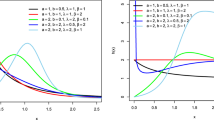Abstract
For theM/G/1 queue there are well-known and simple relationships among the second moments of waiting time under the first-in-first-out, last-in-first-out, and random-order-of-service disciplines. This paper points out that these relationships hold in considerably more general settings. In particular, it is shown that these relationships hold forM/G/1 queues with exceptional first service,M/G/1 queues with server vacations, andM/G/1 queues with static priorities.
Similar content being viewed by others
References
O.J. Boxma and W.P. Groenendijk, Pseudo-conservation laws in cyclic service systems, J. Appl. Prob. 24 (1987) 949–964.
S.L. Brumelle, On the relation between customer and time averages in queues, J. Appl. Prob. 8 (1971) 508–520.
S.L. Brumelle, A generalization ofL = λW to moments of queue length and waiting times, Oper. Res. 20 (1972) 1127–1136.
B.T. Doshi, Queueing systems with vacations — A survey, Queueing Systems 1 (1986) 29–66.
S.W. Fuhrmann and R.B. Cooper, Stochastic decompositions in theM/G/1 queue with generalized vacations, Oper. Res. 33 (1985) 1117–1129.
D.P. Gaver, Jr., A waiting line with interrupted service, including priorities, J. Roy. Statist. Soc. B24 (1962) 73–90.
D.P. Heyman, Optimal operating policies forM/G/1 queueing systems, Oper. Res. 16 (1968) 362–382.
D.P. Heyman and M.J. Sobel,Stochastic Models in Operations Research, vol. 1 (McGraw-Hill, New York, 1982).
D.P. Heyman and S. Stidham, Jr., The relation between customer and time averages in queues, Oper. Res. 28 (1980) 983–994.
I. Iliadis, A two-stage system operating as anM/G/1-queue, IBM Research Report RZ1889 (1989).
J. Keilson and L.D. Servi, Oscillating random walk models forGI/G/1 vacation systems with Bernoulli schedules, J. Appl. Prob. 23 (1986) 790–802.
Y. Levy and U. Yechiali, Utilization of idle time in anM/G/1 queueing system, Man. Sci. 22 (1975) 202–211.
W.L. Maxwell, On the generality of the equationL = λW, Oper. Res. 18 (1970) 172–174.
L. Takács, Delay distributions for one line with Poisson input, general holding times, and various orders of service, Bell Sys. Tech. J. (1963) 487–503.
H. Takagi,Analysis of Polling Schemes (MIT Press, Cambridge, MA, 1986).
P.D. Welch, On a generalizedM/G/1 queueing process in which the first customer in each busy period receives exceptional service, Oper. Res. 12 (1964) 736–752.
M. Yadin and P. Naor, Queueing systems with a removable service station, Oper. Res. Quarterly 14 (1963) 393–405.
Author information
Authors and Affiliations
Rights and permissions
About this article
Cite this article
Fuhrmann, S.W. Second moment relationships for waiting times in queueing systems with poisson input. Queueing Syst 8, 397–406 (1991). https://doi.org/10.1007/BF02412262
Received:
Revised:
Issue Date:
DOI: https://doi.org/10.1007/BF02412262




